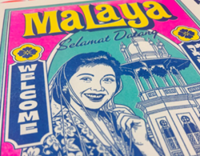After 40 years abroad as a performance maker, educator, and writer, Lee continues to showcase her work in Malaysia, exploring the body as a meeting point of habits and histories. Photo: Yvonne Chew
Few performances go beyond their stage-bound existence to become something more personal: a practice, a philosophy, an everyday tool for navigating life.
Touch Me Hold Me Let Me Go by Vancouver, Canada-based performance maker Lee Su-Feh is one such work, which is set to play at Five Arts Centre, 9th floor, GMBB in Kuala Lumpur from March 5-9.
It can be described as a rhythm, an embodied algorithm, and even a secular “prayer” that invites us into a deeper relationship with ourselves and others.
Presented as a lecture performance, Touch Me Hold Me Let Me Go unfolds as a layered, immersive experience that moves between guided instructions and organic exploration.
Living, breathing encounter
Lee’s voice and movement draw participants and audiences into an awareness of breath, touch, and relational space.
The performance is therefore not a rigid, choreographed spectacle, but a living, breathing encounter with presence.
Throughout the performance, Lee engages with the titular phrases in different modes.
“Touch Me” invites audiences to notice sensation, connection, and consent – both within themselves and with those around them.
“Hold Me” explores the tension between support and release, asking how bodies can offer and receive care.
“Let Me Go” is a lesson in surrender, in trusting the rhythm of breath and body to find its way forward.
This way, Touch Me Hold Me Let Me Go acts as a scaffold for self-awareness, offering a structure through which participants and audiences alike can feel into their bodies, breathe through resistance, and practice “attunement” to the spaces and people around them.
It is, in Lee’s words, a way of “centring the body in practice.”
The work has taken time to become what it is today. Although initially developed online during the pandemic, parts of the work can be traced to Lee’s roots in the Fitzmaurice Voicework pedagogy and her lifelong studies in Chinese martial arts, Qigong, and Daoism.
The performance also features poems from Scores For Dancing Across Distances, written by Lee between 2018 and 2020, during her three-year residency at Dancemakers Creation Centre in Toronto.
With the ease of restrictions over time, Lee transitioned the work into physical spaces, gradually integrating music, lighting, and holding space for audience participation.
“When I first performed it in 2023, it was the first in-person iteration after developing it on Zoom during the lockdown years of Covid,” says Lee, a Malaysian-born with roots in Selangor, in a recent interview.
“That first time, it was about feeling everything in my body – in a room, with live musicians, with light, and simply gathering data on my impulses. I wasn’t thinking too much about space or structure, just observing what was happening,” she adds.
Since the first iteration which took place at Five Arts Centre in February 2023, Lee has continued to work on the process, refining it and working on understanding her relationship with space and the bodies within it, as well as how rhythm and music shape the experience.
“So there are these textural shifts that I try to feel my way through, but also guide the audience. The textures are always changing, and there are many layers to it, between movement, music, lighting, and even spoken word,” says Lee.
“Every time I perform it, I try to understand each layer, before moving to the next, and I hope to draw audiences to do the same as well. Each iteration builds on the last, bringing more clarity and depth to the work,” she adds.
Like the earlier iteration (in 2023), Lee collaborates next week with award-winning music designer Kent Lee and lighting- multimedia designer Syamsul Azhar, whose artistry continues to engage and respond to the evolving nature of Touch Me Hold Me Let Me Go.
Their work is robust, ushering audiences into a heightened state of embodiment.
The body, the algorithm
The body is never neutral. It is a political statement, shaped by histories of colonisation, gender expectations, societal norms, and cultural narratives. To be in tune with one’s body is to resist the structures that seek to control it.
As a performance maker, Lee has spent years investigating the body as a repository of histories and habits. Influenced by her long-term engagement with somatic movement techniques, she articulates an understanding of the body as both deeply personal and political.
Her work highlights the importance of reclaiming the body as a site of agency, choice, and self-expression.
Touch Me Hold Me Let Me Go offers a radical proposition: to listen deeply, to feel fully, and to assert presence without apology. This is especially significant to explore in post-colonial contexts, where bodies have historically been regulated, disciplined, and shaped by external forces.
By cultivating awareness and embodiment, Lee’s work challenges these ingrained narratives, offering a method of self-determination through movement and voice.
One example of its transference and application as a framework can be found in Lee Ren Xin’s practice.
Ren Xin is a dance artist, member of Five Arts, and the producer of Touch Me Hold Me Let Me Go. Having participated (and facilitated) Lee’s previous workshops, Ren Xin reflects that the algorithm offers a profound sense of alignment.
“It was as if Su-Feh articulated something I had been intuitively searching for,” she says.
Ren Xin applies the principles of Touch Me Hold Me Let Me Go in RePublic, her ongoing public performance project that explores bodies in urban space.
Through walking-based interventions, participants engage with the city through somatic awareness, movement, and voice.
The algorithm acts as a grounding mechanism, allowing performers and audiences to navigate urban environments with heightened sensitivity.
“Su-Feh’s Scores For Dancing Across Distances provided us a manual for how to feel support within our body and collectively to navigate around obstacles, whether the obstacle was external or internal. It was a form of support for us to navigate the spaces we were in and to remain connected to our own bodies through movement and voice,” says Ren Xin.
By tuning into these rhythms, participants of RePublic were able to cultivate a greater sense of presence in unfamiliar, or even contested spaces.
Her work with RePublic demonstrates how Lee’s methodology extends beyond the studio and performance venue, offering practical tools for reimagining movement, place, and belonging within the public sphere.
At its heart, Touch Me Hold Me Let Me Go is a tool to reclaim the body, its presence, and its relationship with others. This act of reclaiming – whether in personal practice or in collective settings – echoes throughout the work.
In a world that often dictates how we should move, speak, and be, Touch Me Hold Me Let Me Go offers an alternative: a way of listening deeply, holding carefully, and letting go with grace. It is not just a method for performance but a way of life.
And for those willing to engage, it is an offering – a gentle yet profound reminder that within the rhythms of touch, hold, and release, we find ourselves anew.
Touch Me Hold Me Let Me Go will be showing at Five Arts Centre, 9th floor, GMBB in Kuala Lumpur from March 5-9. More info here.








